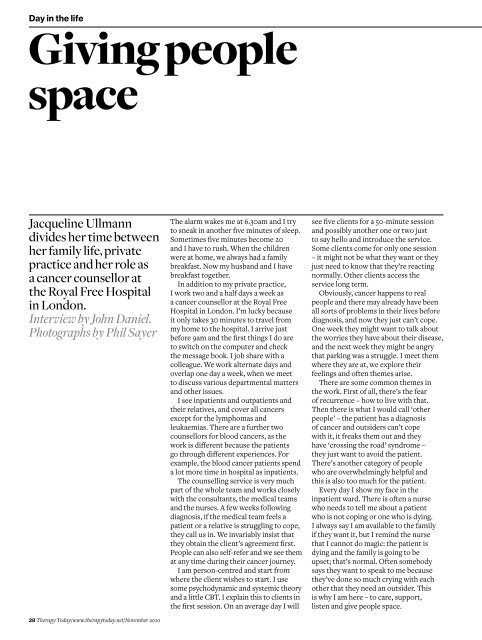Therapy Today
15301_november%202010
15301_november%202010
Create successful ePaper yourself
Turn your PDF publications into a flip-book with our unique Google optimized e-Paper software.
Day in the life<br />
Giving people<br />
space<br />
Jacqueline Ullmann<br />
divides her time between<br />
her family life, private<br />
practice and her role as<br />
a cancer counsellor at<br />
the Royal Free Hospital<br />
in London.<br />
Interview by John Daniel.<br />
Photographs by Phil Sayer<br />
28 <strong>Therapy</strong> <strong>Today</strong>/www.therapytoday.net/November 2010<br />
The alarm wakes me at 6.30am and I try<br />
to sneak in another five minutes of sleep.<br />
Sometimes five minutes become 20<br />
and I have to rush. When the children<br />
were at home, we always had a family<br />
breakfast. Now my husband and I have<br />
breakfast together.<br />
In addition to my private practice,<br />
I work two and a half days a week as<br />
a cancer counsellor at the Royal Free<br />
Hospital in London. I’m lucky because<br />
it only takes 30 minutes to travel from<br />
my home to the hospital. I arrive just<br />
before 9am and the first things I do are<br />
to switch on the computer and check<br />
the message book. I job share with a<br />
colleague. We work alternate days and<br />
overlap one day a week, when we meet<br />
to discuss various departmental matters<br />
and other issues.<br />
I see inpatients and outpatients and<br />
their relatives, and cover all cancers<br />
except for the lymphomas and<br />
leukaemias. There are a further two<br />
counsellors for blood cancers, as the<br />
work is different because the patients<br />
go through different experiences. For<br />
example, the blood cancer patients spend<br />
a lot more time in hospital as inpatients.<br />
The counselling service is very much<br />
part of the whole team and works closely<br />
with the consultants, the medical teams<br />
and the nurses. A few weeks following<br />
diagnosis, if the medical team feels a<br />
patient or a relative is struggling to cope,<br />
they call us in. We invariably insist that<br />
they obtain the client’s agreement first.<br />
People can also self-refer and we see them<br />
at any time during their cancer journey.<br />
I am person-centred and start from<br />
where the client wishes to start. I use<br />
some psychodynamic and systemic theory<br />
and a little CBT. I explain this to clients in<br />
the first session. On an average day I will<br />
see five clients for a 50-minute session<br />
and possibly another one or two just<br />
to say hello and introduce the service.<br />
Some clients come for only one session<br />
– it might not be what they want or they<br />
just need to know that they’re reacting<br />
normally. Other clients access the<br />
service long term.<br />
Obviously, cancer happens to real<br />
people and there may already have been<br />
all sorts of problems in their lives before<br />
diagnosis, and now they just can’t cope.<br />
One week they might want to talk about<br />
the worries they have about their disease,<br />
and the next week they might be angry<br />
that parking was a struggle. I meet them<br />
where they are at, we explore their<br />
feelings and often themes arise.<br />
There are some common themes in<br />
the work. First of all, there’s the fear<br />
of recurrence – how to live with that.<br />
Then there is what I would call ‘other<br />
people’ – the patient has a diagnosis<br />
of cancer and outsiders can’t cope<br />
with it, it freaks them out and they<br />
have ‘crossing the road’ syndrome –<br />
they just want to avoid the patient.<br />
There’s another category of people<br />
who are overwhelmingly helpful and<br />
this is also too much for the patient.<br />
Every day I show my face in the<br />
inpatient ward. There is often a nurse<br />
who needs to tell me about a patient<br />
who is not coping or one who is dying.<br />
I always say I am available to the family<br />
if they want it, but I remind the nurse<br />
that I cannot do magic: the patient is<br />
dying and the family is going to be<br />
upset; that’s normal. Often somebody<br />
says they want to speak to me because<br />
they’ve done so much crying with each<br />
other that they need an outsider. This<br />
is why I am here – to care, support,<br />
listen and give people space.


